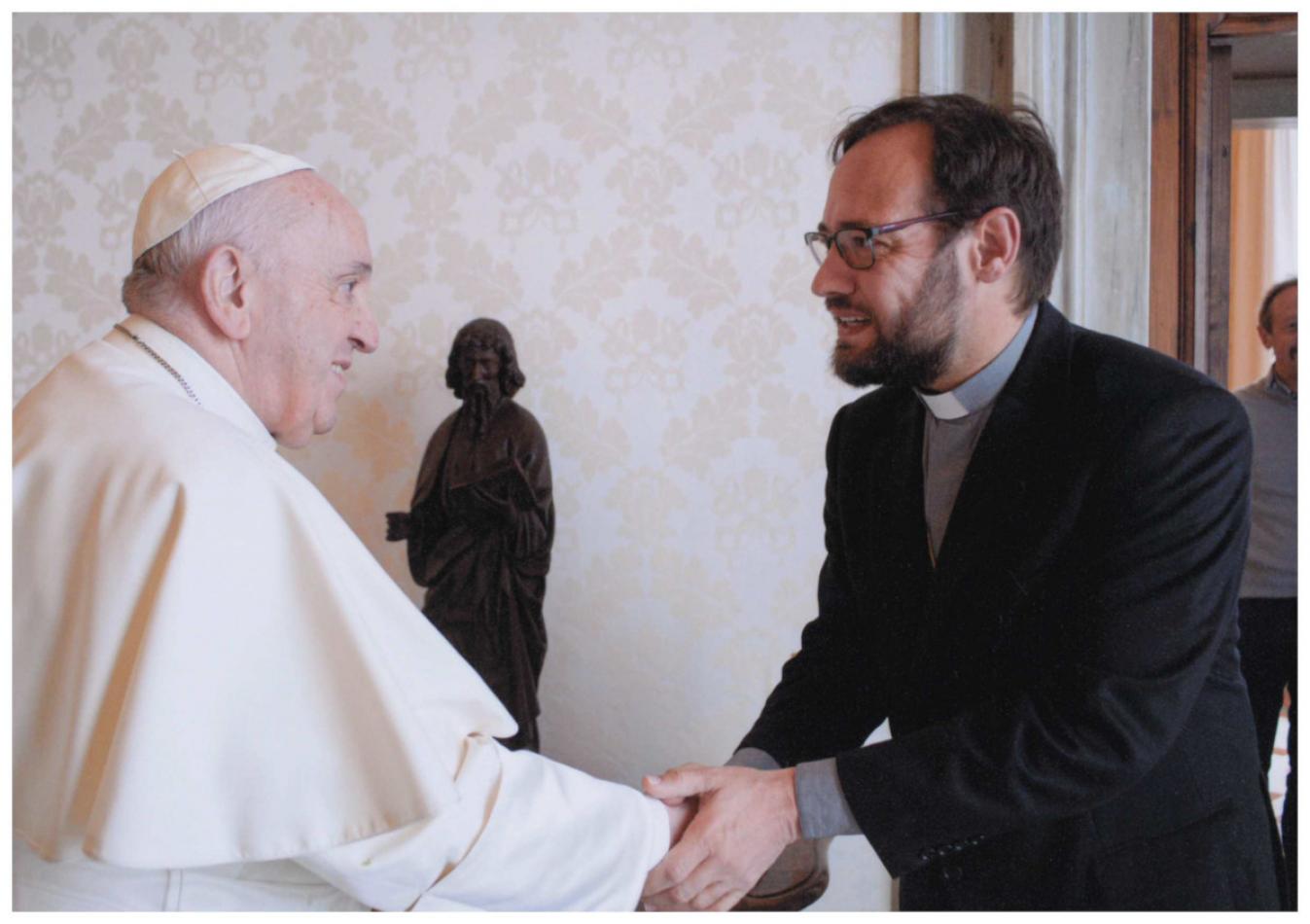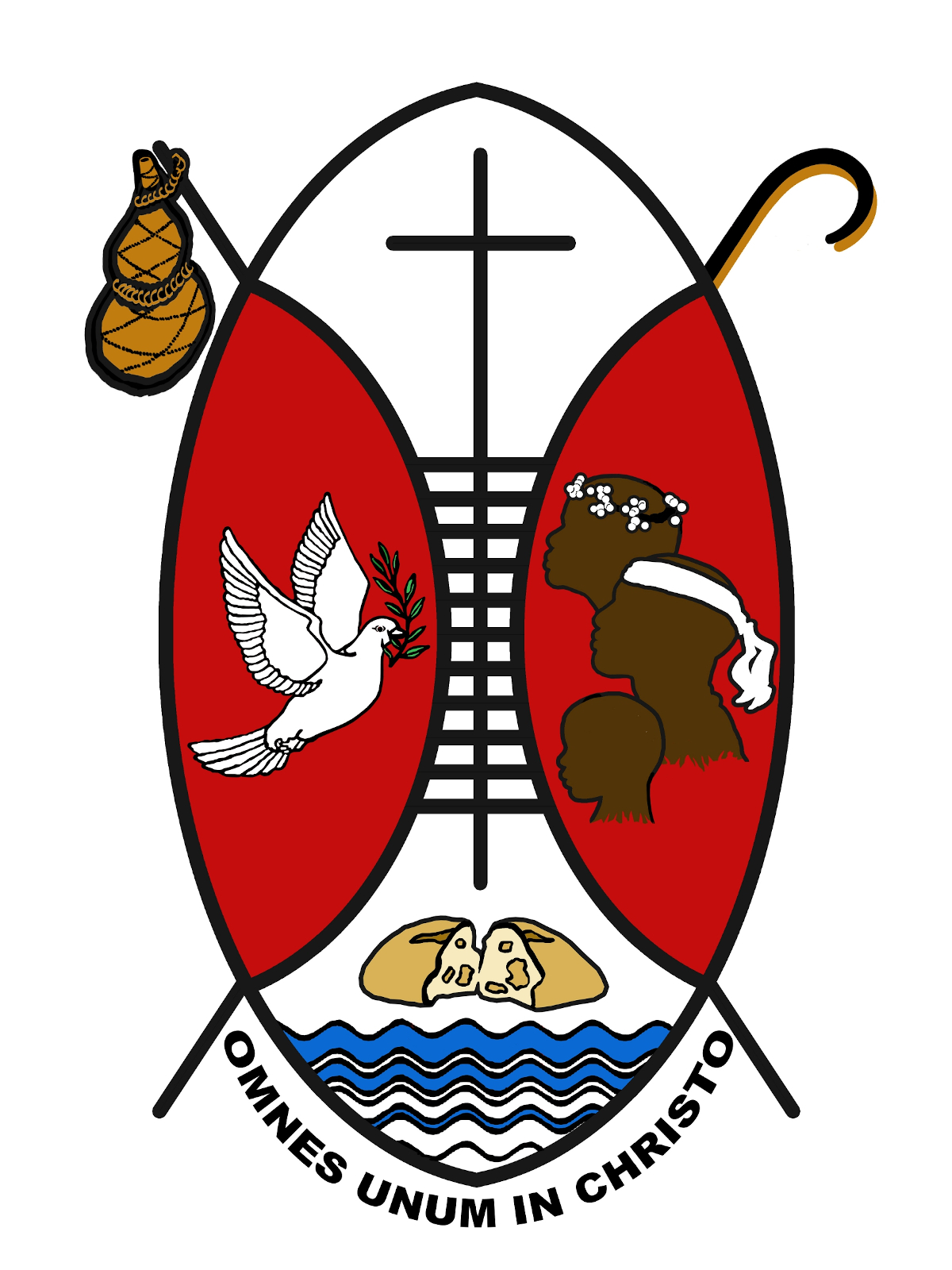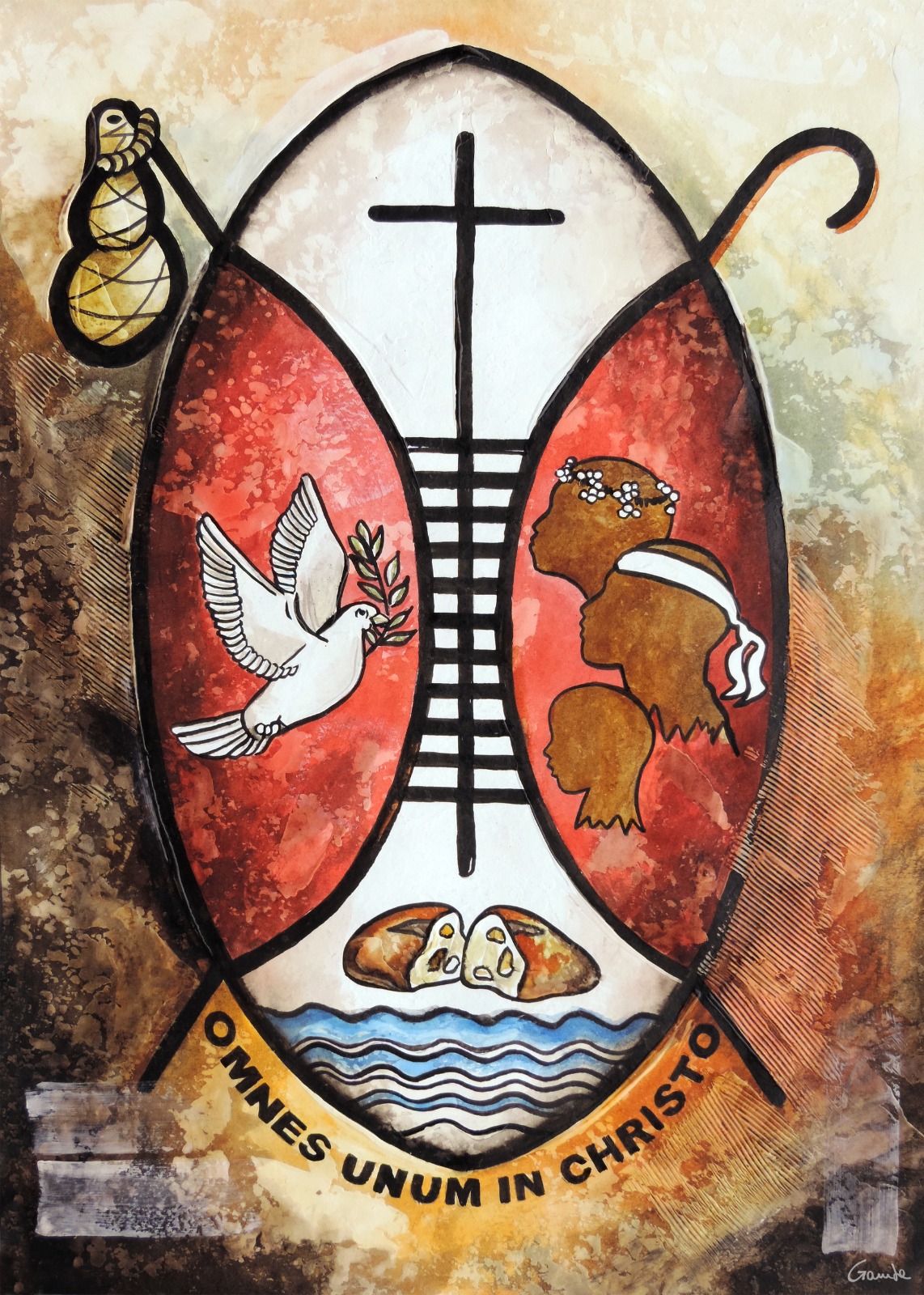Daniel Comboni
Comboni Missionaries
Institutional area
Other links
Newsletter
Friday, March 18, 2022
Fr. Christian Carlassare is leaving to South Sudan. The episcopal ordination and installation are set for March 25. He shares that returning for him means first of all to forgive. Because without forgiveness, there would be no restart, but only a return to the past and what has happened at the time of the attack. It is instead necessary to move on. Jesus teaches mercy as the only way to re-establish relationships where they were interrupted. Mercy is an appeal against selfishness and rejection. Mercy indicates the path of unity and fraternity. In attachment we publish the episcopal coat of arms of Fr. Christian. [In the picture, Fr. Christian's meeting with Pope Francis on March 14, 2022. Photo: Vatican Media]
Starting Anew from Forgiveness
When pope Francis announced the Holy Year of Mercy in 2015, he shared that he had often thought about how the Church could fulfil its mission of being a witness of mercy. And he also said that “Mercy is the very substance of the Gospel”.
A year after my appointment as bishop and the attack I suffered, I return to Rumbek for the episcopal ordination and to celebrate Easter. I leave with feelings of renewed trust in God who never abandons us, and in the local Church and Christian community to walk together hand in hand.
The South Sudanese Church is a poor Church with only few means, but rich with a lively community of people who are resilient and generous. It is a wounded and suffering Church, but there is no lack of faith and hope in healing. It is a young Church, that has a long way to go before it. It is a fragile and imperfect Church that experiences the compassionate love of God and is called to be a witness of mercy.
Jesus' prayer is of great comfort: “I pray for them because they are yours. Keep them in your love so that they may be one. Sanctify them in the truth. Your word is truth” (Jn 17s). And the truth is, we all need mercy. We must welcome it to make truth in our life, to repent and discover that life is a gift. So, we are called to spend ourselves at the service of one another for the life of all. The Church of Rumbek demands truth and forgiveness. The country, since misery and violence unfortunately continue, demands truth and mercy. Only by welcoming these gifts will there be room for peace.
I wondered about the etymological meaning of the word mercy. It comes from the Latin word Miseri-cordia. Miserere means to have pity, whereas Miseria simply means misery. Cor or cordis means heart. Therefore, the meaning of mercy is to nurture in the heart a feeling of compassion for the moral or material misery of others. Our heart is compassionate when the misery of others makes us recall our own misery, inadequacy and emptiness which are filled only by the merciful love of God.
The Jews used to express this concept of an open heart able to welcome brothers and sisters with the term Rahamim. This word indicates the maternal womb that welcomes the new life that is born. So, mercy indicates the space made within oneself for the life of others: it is a space of profound communion, of feeling with others, of rejoicing with others and suffering with others. Mercy is therefore nothing more than God's appeal against selfishness, indifference and rejection of others. Instead, it indicates acceptance, compassion, and embracing others. And it becomes the ability to establish relationships and rebuild those that for some reasons were left broken.
On March 25, the feast of the Annunciation, I will be ordained Bishop of Rumbek. I did not choose this specific occasion, but it was given to me as a gift. The yes of Mary is a beautiful answer to the first yes of God when he called human beings to exist. I too am called to repeat my yes to the Church and people of South Sudan in a way that is perhaps a little more radical than I have managed to live up to now. I pray that the people of Rumbek may also say their yes to a communal ecclesial journey. For this I entrust myself to the Lord and to your prayers. The prayer that the people of Rumbek recited every day in my name has been source of great strength. Thank you.
I take up what Saint Augustine wrote about his episcopal ministry: “Pray for me so that I will be able to bear the burden. And join me to bear all burdens together. If Christ did not carry our weight, we would be crushed by it; if he didn't carry us, we would end up succumbing. Where I’m terrified by what I am for you, I am given comfort by what I am with you. For you I am a bishop, with you, after all, I am a Christian. The first is the name of an office undertaken, the second a name of grace; that one means danger, this one salvation”.
Therefore, this is my journey of Lent this year in preparation to celebrate Easter: it is a deep experience of mercy and forgiveness which opens the way to start anew and welcome new life in Christ.
HAPPY EASTER of RESURRECTION
Father Christian Carlassare, mccj
Bishop-elect of Rumbek (South Sudan)
THE COAT OF ARMS OF RT. REV. CHRISTIAN CARLASSARE,
BISHOP OF RUMBEK
The coat of arms takes the shape of an African shield. Instead of the two traditional spears, the pastoral staff and the walking stick of the pilgrim are crossed behind the coat. The travelling stick has a gourd tied on it which is used to carry milk for the journey.
The main field of the shield is white. This colour symbolizes openness, availability and holiness. It is in a form of stripe starting from the bottom and rising upwards, indicating the path of life which has to be taken up with courage. The two side shapes are red in colour and symbolize the land of Africa that demands Christian witness and self-giving to promote life.
The path of Christian life starts with the water of baptism which indicates our conversion and profession of faith. This faith is nourished with bread: bread to eat and the Eucharistic bread which is Jesus Christ who comes to us and accompanies us along the way. The Eucharistic bread is bread broken and given to us, as Jesus gave us his life, and calls us to be bread broken and given to all our brothers and sisters. The broken bread also represents our mission. And, as St Daniel Comboni used to say, the work of God, namely the mission of evangelization, starts at the foot of the cross. The cross of suffering can be an obstacle to continue on our faith journey but may also become a ladder to climb further.
The three figures on the right side represents three African people: a woman, a man and a child. The man wears a white headband and the woman white pearls to signify the dignity and liberation of the African people, and the commitment of each Christian to bring that liberation to others. The child reminds us of our vocation to help others grow in Christ. They also represent the Holy Family – Jesus, Joseph and Mary – as the cathedral of Rumbek stands under their patronage. But they may embody every family which is a domestic Church. They also help us recall the African saints and martyrs, such as St Josephine Bakhita, Fr. Barnaba Deng, Fr. Arkangelo Ali, catechists and other Christians who offered their life for the faith and the salvation of other people.
On the left side there is the biblical white dove carrying an olive branch, symbol of peace and reconciliation. This message tells the people of South Sudan that God wishes to give us his peace and urges all to leave behind past divisions and violence. He invites us to give peace a chance. Any kind of discrimination or marginalization is a deliberate denial of the unity which we all have in Christ.
Therefore, the motto OMNES UNUM IN CHRISTO is taken from St Paul to the Galatians 3:28, “There is neither Jew nor Greek, slave nor free, male nor female, for you are all one in Christ Jesus”.






